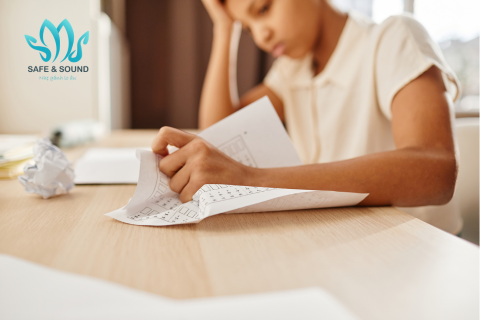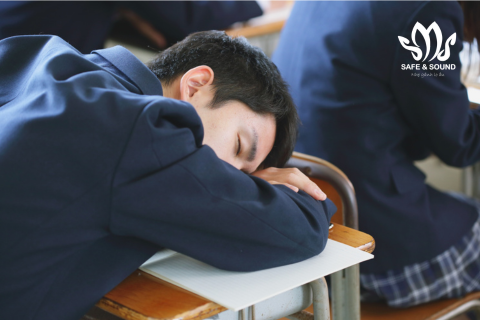Reducing Exam Pressure for Final-Year Students: Balancing Academic Performance and Mental Well-being | Safe and Sound
Final exams: whether it is a transfer exam, a high school graduation exam or a university entrance exam, are always one of the most stressful periods in student life. With a huge amount of knowledge, pressure from family, school and personal expectations, many students fall into a state of fatigue, anxiety, and even psychological disorders. So how can final year students overcome this time in a healthy and effective way? The following article, shared by psychological experts, will help parents, teachers and students better understand how to reduce exam pressure, balance studying and taking care of mental health.
Phi Thuy Linh | Bachelor of Public Health – Mental Health Care Application Safe and Sound
Institute of Medical Technology Applications
1. Early recognition of signs of exam stress

Early recognition of stress signs helps prevent psychological problems.
According to psychologists, early identification of stress signs is the first and most important step to intervene and prevent serious consequences for students. Exam stress is not only manifested psychologically but also affects physical and behavioral health. Some easily recognizable signs include:
- Physical symptoms : frequent headaches, fatigue, digestive disorders, insomnia or light sleep.
- Psychological symptoms : anxiety, loss of confidence, irritability for no reason, feeling depressed, sad, possibly accompanied by negative thinking.
- Behavioral manifestations : not wanting to go to school, not wanting to communicate, easily agitated, irregular eating.
If the above signs last for more than 2 weeks, students should see a psychologist or psychiatrist for timely and appropriate assessment and support.
2. Build a clear and flexible study plan
Many senior students are overloaded because they do not know how to organize their study time. According to psychologists, building a scientific study plan will help reduce stress and increase learning efficiency:
- Break down the content you need to review by week and by day, avoiding cramming it in at the last minute.
- Flexibly change learning methods: combine reading, taking notes, doing exercises, group study...
- Set specific goals for each study session instead of studying aimlessly.
- Keep breaks steady , about 5–10 minutes after every 45 minutes of study.
Psychologists encourage students to study in the “pomodoro” style – studying for 25 minutes and then taking a 5-minute break – to help the brain recover and avoid prolonged stress.
3. Daily mental health care
It is impossible to study well if you are mentally tired. Mental health is the foundation for students to maintain their perseverance and ability to concentrate. Psychologists advise students to do the following activities every day to keep a positive mood:
- Do deep breathing, meditation, or gentle yoga in the morning or before bed.
- Keep an emotional journal : write for 5–10 minutes every day about things you are grateful for, feel happy about, or need to improve.
- Engage in a favorite activity such as listening to music, playing sports, painting or cooking.
- Limit your use of social media if you feel vulnerable to comparison and loss of confidence.
- Talk to a loved one or a mental health professional if you feel overwhelmed.
Psychologists emphasize that a healthy mind is the foundation for sustainable knowledge acquisition.

4. Maintain regular and quality sleep
One of the common mistakes of senior students is to study late at night, cutting down on sleep time to review. This not only reduces learning efficiency but also seriously damages mental health.

Students should get enough sleep to ensure good mental health.
Psychologists recommend that students should:
- Get 7–8 hours of sleep every day.
- Stop studying and using electronic devices at least 30 minutes before bedtime.
- Create a dark, quiet, cool, and comfortable sleeping environment.
- Do not drink coffee or strong tea in the evening.
When the brain is well rested, its ability to remember and process information will be much better.
5. A proper diet supports the spirit
Diet directly affects mood and energy during the day. According to psychologists, seniors need:
- Eat three main meals and supplement with healthy snacks such as milk, fruit or nuts.
- Supplement foods that are good for the brain such as fish, eggs, beans, green vegetables, and whole grains.
- Drink enough water, limit carbonated soft drinks and greasy foods.
- Avoid skipping meals or snacking too much when studying hard.
Psychologists say that a healthy body is the foundation for a stable mind and effective learning ability.
6. Learn to adjust expectations and accept failure
One of the major reasons why students feel pressured is because of the fear of not meeting their own or others’ expectations. Psychologists say that adjusting the perception of success and failure is extremely important:
- Scores should not be the sole determinant of your future.
- Accept that failure is part of growing up.
- Set goals that are within your capabilities instead of following other people's expectations.
- Encourage yourself with positive words instead of blaming or comparing.
When students understand the value of the learning process, not just the destination, their mentality will be lighter and more steadfast.
7. Proper accompaniment of parents and teachers
Parents and teachers are not only knowledge guides but also psychological support during the final stage of high school. Psychologists advise:
- Listen more than talk , avoid imposing.
- Praise the effort , not just the results.
- Do not compare your child with others , because each student has their own strengths and weaknesses.
- Create conditions for children to rest and play enough, avoid overstudying.
- Proactively connect with a school psychologist if you notice signs of instability in your child.
Understanding from family is a valuable "spiritual medicine" that helps students feel more confident when entering important exams.
8. When should I see a psychologist?
Not all students can overcome the pressure of exams alone. According to psychologists, students should be taken to psychological counseling when they have the following signs:
- Insomnia, prolonged anxiety , panic attacks, and excessive nervousness before exams.
- Have negative behaviors such as self-harm, skipping meals, dropping out of school, and withdrawing from society.
- Negative thoughts repeat over and over: “I am useless”, “I can’t pass”, “No one understands me”…
- No more motivation to study , despite being reminded and encouraged.
Timely intervention by a psychologist helps students avoid the risk of depression, anxiety disorders or other psychological disorders in adulthood.
Exams are an important milestone but should not be a burden on students. When students know how to build a scientific study plan, take care of their mental health and receive support from their family and school, they will feel more relaxed and be able to develop their abilities in the best way.
Safe and Sound Clinic - Family health and psychological support
With a team of experienced doctors and specialists, Safe and Sound Clinic is a pioneer in comprehensive health care with health care services from medicine to psychology.
“Early prevention - Timely support - Long-term companionship”.
If you have any doubts or experience any physical or mental health problems, please contact HOTLINE 0964 778 911 (Phone/Zalo, 24/7) for answers and support as soon as possible!
HOW TO MAKE AN APPOINTMENT for online or in-person consultation with an expert
- At SnS Clinic - IMT Institute
- Or download and schedule a consultation on the Safe and Sound app to manage and track your schedule anytime, anywhere.
Safe and Sound (SnS) - Institute of Applied Medical Technology (IMT)
See also:
Potential consequences of academic pressure




